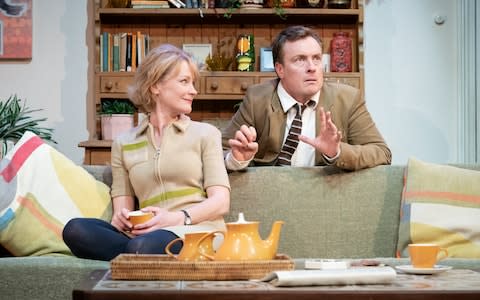A Day in the Death of Joe Egg, Trafalgar Studios, review: both savage and compassionate

Peter Nichols died two weeks before this latest revival of his 1967 loosely autobiographical, taboo-busting classic, about a married couple struggling to cope with their severely disabled daughter, started previewing. We'll never know if he harboured doubts over how the play might fare in today's climate. His protagonists, after all, carelessly toss about words like 'spastic' and 'proper working child'. And there is, today, far more focus on the rights of the disabled than there was even in 2001, when the play was last in the West End.
But, if Nichols did have concerns, he needn't have – Simon Evans's super-starry production, featuring Toby Stephens, Claire Skinner and Patricia Hodge, is both worthy tribute and a resounding vindication: the play, if anything, feels more savagely true than ever.
On one level Joe Egg is about the theatre itself, and the possibilities it offers for escapism, and Evans' self-reflexive, vaguely 1960s-set production depicts the suburban house in which the play is set as a wooden box on a revolve – it's both a stage set and prison.
Here, in a scrupulously neat, tasteful living room that screams out middle class normality, rumpled comprehensive teacher Bri and his stay at home wife Sheila indulge in faintly mocking little role plays that project alternative personalities onto Joe (beautifully played by Storme Toolis, the first disabled actress to take the role) even while their daughter sits mute and crumpled in a wheel chair.
They also act out the story of their initial battles with doctors: the GP who said Joe's fits were probably wind; the Austrian consultant who told them their baby would always be a 'wegtable'. The establishment attitudes on display are ghastly, the couple's humour desperate.

For Skinner's placid, deeply committed Sheila, these are harmless superficial coping mechanisms: what fundamentally helps her is her receptivity to the possibility her daughter may yet still enjoy a quality of life. For Stephens' emotionally arrested Bri, however, the despair has the stench of sour milk. He's long ago given up; worse, role play has now become a way of being. Everything is a joke, a performance. Yet as his smug, self styled socialist friend Freddie (Clarence Smith, excellent), whose unsavoury views on the disabled border on the utilitarian, points out, the fallacy of the sick joke is that “it kills the pain, but it changes nothing”.
The point Evans' initially slow moving production brutally reinforces, however, is that, although our attitudes to the disabled have rightly changed, the challenges for families caring for them haven't.
Evans serves up plenty of grotesque comedy, and there is excellent support from Hodge as Sheila's waspish mother-in-law who lovingly knits her grandchild cardigans even while saying over again how lovely it would be if Joe could run around.
Stephens, meanwhile, takes a big risk in making Bri so adolescently nihilistic, the love for his daughter long ago squeezed out of him, but you'd need a heart of stone not to feel for him. That's the risk this production takes, too – Bri's focal crisis feels quite irredeemably selfish – but the compassion and integrity of Nichols' script wins through. It's a bleakly moving evening.
Until Nov 30. Tickets: 0333 700 8800; joeeggplay.com


